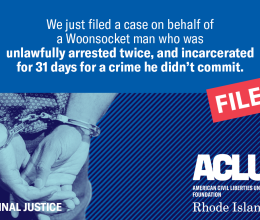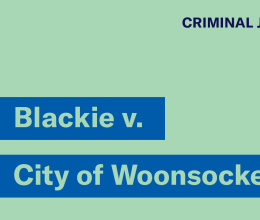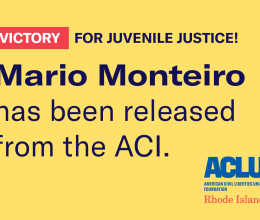The ACLU of Rhode Island today filed a federal lawsuit on behalf of a North Smithfield resident, challenging the police department’s refusal to remove from its files a note falsely claiming that he is “dangerous,” “psychologically unstable,” and has numerous weapons at his house. Police officials have acknowledged that they have no basis for the claims contained in the note, which was uncovered while the ACLU was litigating another pending lawsuit on behalf of the resident, Jason Richer.
Today’s lawsuit, filed by ACLU of RI volunteer attorneys Thomas W. Lyons and Rhiannon Huffman, expresses concern for Richer’s safety because of the false information in his police file. The purpose of such notes is to alert police officers of possible dangers when they interact with individuals. The note, the lawsuit claims, “increases the possibility that a police officer, believing Mr. Richer to be psychologically unstable, dangerous, and heavily armed, may overreact to some action or statement by Mr. Richer and shoot him and other members of his household.”
The suit alleges that, because of the note, “increased and reasonable fear of contact with the police has constrained him from contacting the police when he otherwise would have done so,” and that he is “more reluctant to leave his house and to go outside where he might encounter the police.”
The note dates back to an incident in 2008 where police responded to Richer’s house after his now ex-wife called to express concern that he had tried to harm himself by taking an overdose of pills. Although Richer explained that he was not suicidal and that his wife had misconstrued a conversation they had, police forced him to submit to a mental health evaluation at Landmark Hospital. The doctor who saw him there discharged him shortly after his arrival, and no charges were ever filed or any other action taken. In the meantime, police seized “for safe keeping” three lawfully registered guns from a locked case in Richer’s garage. When Richer tried to retrieve the guns, police refused to return them, telling him he would need to obtain a court order. That ultimately prompted a lawsuit from the ACLU in 2015, and it was while litigating that case, which is pending, that the police file note came to light. It was also in that case that the police chief and other officers in the Department acknowledged they were aware of no factual basis for the note.
The new lawsuit claims that the police department’s refusal to remove the continued maintenance of the note in police files violates Richer’s First Amendment right to petition the government, and his rights to due process and freedom from unreasonable search and seizures. The suit asks the court to order removal of the note from the police files, and to award him damages for the violation of his rights.
The only reason the Town has given for maintaining the note, notwithstanding the lack of any factual basis for it, is its desire to “maintain the status quo” until the earlier lawsuit, dealing with the unlawful seizure of his firearms, is completed.
The police file note states in full:
“11/06/2009 1213--Subject is psychologically unstable and should be considered dangerous. We have taken weapons out of his house in 2008 however [badge] 24 states there are more inside the residence. USE CAUTION.”
Plaintiff Richer said today: “It’s hard to believe the Town would condone the continued placement of a note in a citizen’s call log that both maligns and puts in danger an innocent taxpayer, despite the admission of the Police Chief that no one in the department is qualified to make psychological determinations. Is there no oversight in this police department? Is there no accountability for what is put in the file of law-abiding citizens? I've been driving around unknowingly labeled as ‘psychologically unstable, dangerous and use caution’ for 9 years! This note is a recipe for disaster.”
ACLU of RI executive director Steven Brown added: “The fortuitous revelation of the note in Mr. Richer’s police file should give all of us pause, as it inevitably leads to a larger question: What other misinformation about Rhode Islanders is routinely thrown into police files and possibly misused? I suspect we would not like the answer.”







